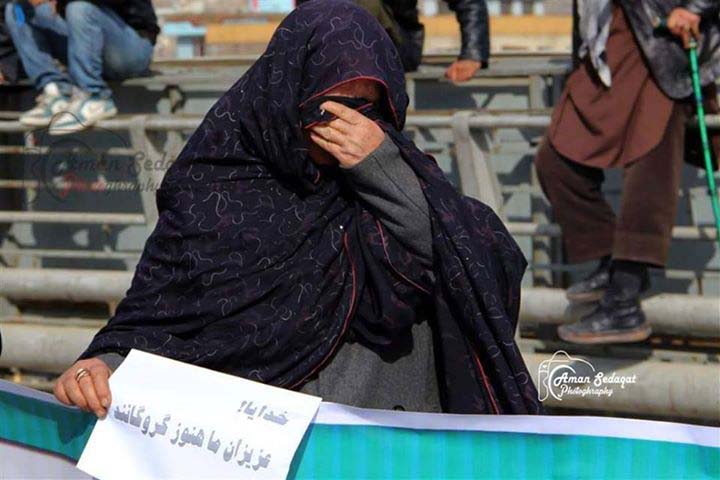It is almost a month since 31 civilian passengers were abducted by unknown militants in Zabul province. The military operation going on in Zabul province, which was aimed at saving the passengers seem to yield no tangible result. This is while it has virtually closed all communication channels between the Taliban and local elders in Zabul and Ghazni provinces. In recent days, unconfirmed reports suggested that the militants have relocated the kidnapped passengers to Taliban-controlled districts in Ghazni province. With the mysterious kidnapping of 31 passengers unresolved, the public is gradually getting desensitized to their fate and the government does not seem to be serious in resolving the issue.
With each passing day, the glimpse of hope to have the passengers released is vanishing. Unlike the initial days of the kidnapping, local elders and inter-ethnic negotiators now seem helpless and express exhaustion over the situation. Despite all the media coverage and government or non-government efforts to free the passengers, there are still a lot of ambiguities over the kidnapping. During last three weeks, some claimed the perpetrators are affiliated with Islamic State groups, as called Daesh in Afghanistan. However, many local sources and government officials have categorically denied this. They have blamed the Taliban, or at least some local commanders previously loyal to the group, for the kidnapping of the 31 civilians. Despite widespread rumors that some foreign militants may be involved in the kidnapping, a number of locals and government officials have said that the Taliban are responsible for the incident. The Taliban, however, have denied being involved in the abduction.
This has now made the problem even more complicated. Given all these claims and counter-claims, the mystery whether who is behind the abduction remains obscure. There are different accounts of the demands of the militants. When negotiating with local elders and government interlocutors, the militants must have made some demands to the government and local mediators. Some reports suggested in early days of the event that they wanted back a vehicle full of ammunition seized by security forces. However, what is clear is that the government failed to make compromises and continue engaging in talks with the militants through local elders.
Also the government has not acted transparently regarding the development of the negotiations between the militants and the locals. Government officials have put the public in dark over the issue. Whether the kidnappers have reached out to the Afghan government for any sort of demands is also not known to the public.
On the other hand, the government did not respond to the issue as the people expected. The military operation for rescuing the hostages was widely praised by the public, but there were also some skepticism. However, it is almost obvious that it was a wrong move at a wrong time which would certainly is not going to help releasing the hostages. The military operation was in fact meaning abandonment of the hostages by the government.
There are perhaps many reasons related to the government’s lack of willingness to make the issue its top priority. In recent months, the government has stepped up efforts to bring the Taliban on negotiation table to end the decade-long conflict. As many other disastrous attacks by the Taliban, the government seems to be deliberately downplaying the issue so to appease the militant groups. Among the several justifications for the government officials in taking the issue not seriously, one is that fact that deaths and casualties in Afghanistan have become so common that have desensitized not only the ordinary people but also the government and other key players to accept that deaths occurring on daily basis in Afghanistan are inevitable.
Deputy Chief Executive Officer, Haji Mohammad Mohaqiq, on Friday March 12, 2015 confirmed contact between government officials and representatives of the Taliban and another group for the release of kidnapped passengers saying that he had informally sent a delegation to Quetta, the capital of Pakistan’s southwestern Balochistan province.
He added the group, to which the kidnappers were linked, had been told that innocent people had been seized. “Another Karachi-based extremist group has also been contacted.
The kidnapping is of grave concern not only for Hazaras as an ethnic minority in Afghanistan but for the country as a whole. The issue, and its unpredictable consequences, has the potential to spark ethnic tensions in the war-torn country. Such tensions could easily erupt in areas where ethnic groups live in vicinity while government has no effective security and governance coverage. Such areas could be the starting point for such inter-ethnic tensions as locals in vulnerable areas are finding themselves in difficult security situation which is forcing them to arm and defend their villages against any invaders. This has happened in the past and could happen at any time now or in the future if the government fails to protect the relative harmony between the people by providing security.
Another justification that the issue and other similar incidents could develop disastrous for Afghanistan is that foreign hands may be involved in such security incidents while local insurgents are still believed to be responsible as whole. Involvement of foreign players may quickly get the situation uncontrolled. The simple fact that militants drag certain passengers belonging to an ethnic group is quite worrisome. Such systematic moves in countries like Iraq, Pakistan and some African countries have proved destructive not only for the minority groups but also for the governments’ ability to govern effectively.
Therefore, the government needs to act decisively and change the course it has taken so far. The government’s visible indifference to the fate of the passengers will seriously harm the government’s credibility in maintaining its commitment to the safety and security of the people. The government should take those who are responsible for the incident and redouble its efforts to release the passengers. The right approach would be for the government to go through negotiation channels if it is determined to save the hostages.

